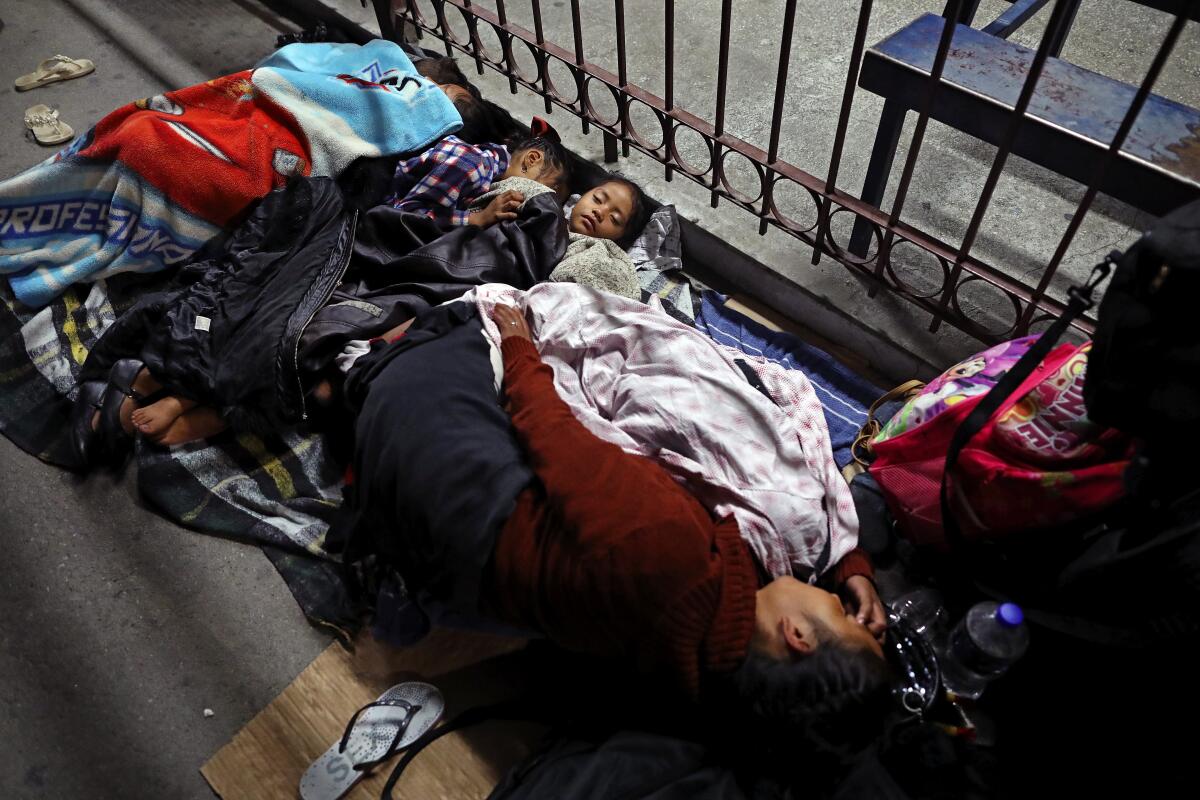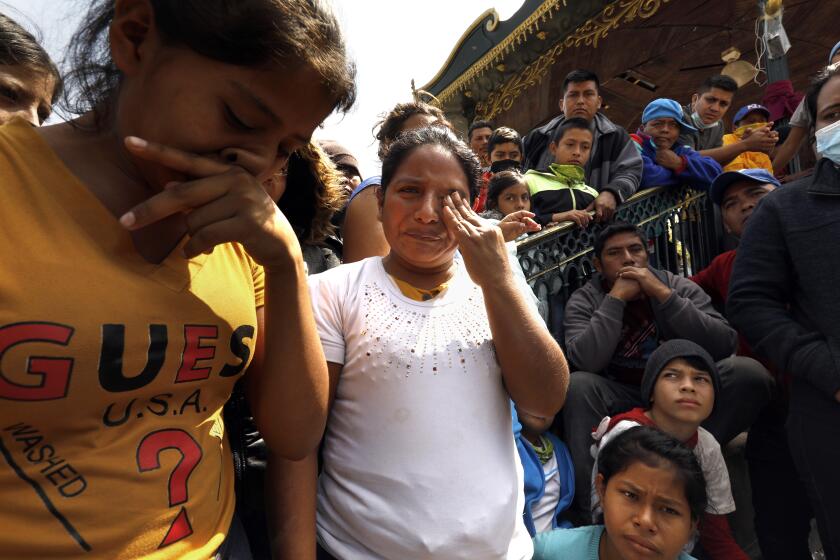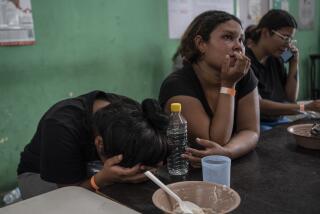Op-Ed: A Trump-era pandemic policy is undermining public health at the border. Biden must end it

In a steadily growing encampment mere yards south of the U.S.-Mexico border, we are led to a little girl with a fever. She lies dehydrated and wrapped in her parents’ possessions inside a water-logged tent. Recently deported from the United States under a Trump-era pandemic policy, the family is camped next to the border wall with thousands of others who have nowhere to go.
In recent months, much attention and political outrage has focused on unaccompanied children crossing into the U.S. and being detained in government custody. But less scrutiny has been given to the mass deportations of migrant families and vulnerable adults expelled with no due process during the pandemic under a U.S. health law called Title 42, which allows the government to bar people from countries where communicable disease exists.
For more than a year — and in the name of public health — the U.S. has been summarily expelling migrants arriving at the U.S.-Mexico border, ignoring epidemiologists and health experts, violating the migrants’ human rights and creating a critical situation in Tijuana and other border towns.
As medical professionals who provide care in encampments and shelters in Tijuana, we’ve seen how this expulsion policy has caused a humanitarian emergency in northern Mexico. Even as these encampments become increasingly overcrowded and unsafe, many migrants and their families are still being denied entry or quickly deported by the U.S. government. The Biden administration has carried out roughly 350,000 expulsions, including nearly 50,000 families.
The administration, as part of a legal settlement, recently agreed to process up to 250 asylum seekers a day deemed vulnerable by advocacy groups so they may continue to pursue their asylum cases in the U.S.
However, this is nowhere near sufficient to address the widespread human rights violations and humanitarian crisis we see every day in Tijuana. There are still many thousands of asylum seekers along the border who were previously subjected to inhumane detention and expulsions — and who are now grappling with the subsequent fallout and trauma.
Migrants in Tijuana are subjected to targeted violence by cartels, squalid conditions in encampments and shelters, and despair after the U.S. lied to many of them about their expulsions. Some asylum seekers have reported Border Patrol agents telling them they were being transferred to a shelter in another U.S. city when, in fact, they were sent to Mexico.
Even as Biden administration officials call Title 42 a ‘source of pain,’ they’re defending the Trump-era pandemic policy.
As co-founders of an organization providing healthcare to migrants stranded in Tijuana, we have been working around the clock to provide them medical care.
We have seen increasing dehydration, malnutrition and infectious diseases associated with overcrowding. At an encampment in Tijuana that shelters some 2,000 asylum seekers, there are no formal sanitation facilities; gastrointestinal illnesses are causing severe illness in newborns and young children. Chronic diseases and mental health disorders, left untreated, could become death sentences. The migrants have been forced to camp amid very cold temperatures at night during winter months.
Disease is not the only threat. Families fear cartel activity and kidnappings since vulnerable migrants are often targeted for violence. More than 80% of LGBTQ refugees in Baja California reported surviving an assault in Mexico from mid-February to March. Last month, we received a late-night phone call from a lawyer asking for our help. The client — a transgender woman — had been stabbed, forced into hiding and was afraid to go to the local hospital in Tijuana because they are often unsafe places for sexual minorities. We were able to provide her basic medical care, but many others are not as lucky.
The Title 42 expulsion order has been used by the U.S. to essentially eliminate asylum at the border and put thousands of people in immediate danger by either returning them to their countries of origin or to Mexican border cities, even if the asylum seekers are not Mexican or do not speak Spanish. While the administration recently ceased cross-border expulsion flights — a reckless approach during the pandemic used to transfer and expel migrants to Mexico — officials have reserved the right to reinstate them as needed.
The policy has disproportionately affected Black migrants, who are often Haitian. They are deported without due process back to persecution in Haiti or to pervasive anti-Black violence in northern Mexico — leaving them without access to healthcare, psychological support, safety or asylum. More Haitians, over 1,200, were expelled in the first weeks of the Biden administration than during the 2020 U.S. fiscal year, and more than 60% of Haitian asylum seekers blocked from U.S. protection have been victims of crime in Mexico.
Instead of unlawfully shutting down access to asylum, the administration should uphold American values and asylum laws, listen to the guidance from public health and refugee experts, and welcome migrants with dignity. Social distancing, masks and vaccines are the most effective measures to limit the spread of COVID-19 — not a discriminatory ban on at-risk asylum seekers.
A system of processing migrants safely is largely already in place, which has allowed thousands of individuals sent back under Trump’s “Remain in Mexico” policy to safely cross with the help of the United Nations and humanitarian organizations like ours.
While the interim changes from the Biden administration make a life-changing difference for the 250 per day now allowed to apply for asylum from the refuge of the U.S., thousands more at-risk families urgently need the same protections. Title 42 undermines public health along the border — and must be withdrawn immediately.
Psyche Calderon, Hannah Janeway and Ronica Mukerjee are medical providers and co-founders of Refugee Health Alliance.
More to Read
A cure for the common opinion
Get thought-provoking perspectives with our weekly newsletter.
You may occasionally receive promotional content from the Los Angeles Times.











